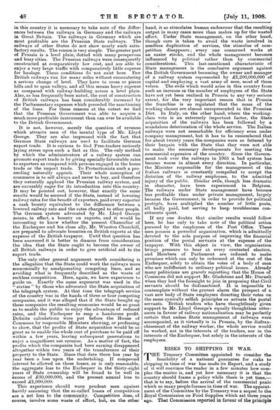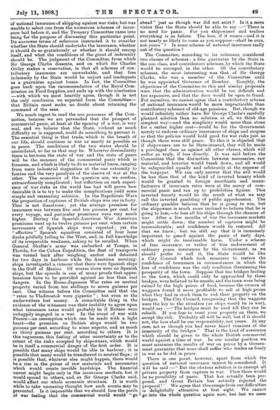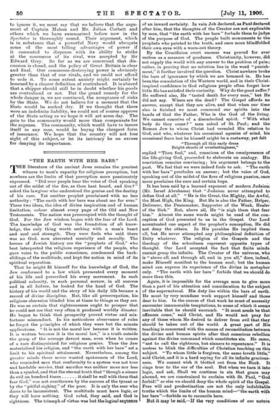RISKS TO SHIPPING IN WAR. T HE Treasury Committee appointed to
consider the feasibility of a national guarantee for risks to shipping in time of war has made its Report, and a study of it will convince the reader in a few minutes how com- plex the matter is, and yet how necessary it is that the country should frame a policy while there is yet time,— that is to say, before the arrival of the commercial panic which so many people foresee in time of war. The appoint- ment of the Committee by the Treasury was a sequel to the Royal Commission on Food Supplies which sat three years ago. That Commission reported in favour of the principle
of national insurance of shipping against war risks, but was unable to select one from the numerous schemes of insur- ance laid before it, and the Treasury Committee came into being for the purpose of discussing this particular point Its narrower terms of reference instructed it to consider whether the State should undertake the insurance, whether it should do so gratuitously or whether it should recoup itself, and what the conditions of the grant of indemnity should be. The judgment of the Committee, from which Sir George Clarke dissents, and on which Sir Charles Ottley makes a reservation, is that all schemes of con- tributory insurance are unworkable, and that free indemnity by the State would be unjust and inadequate as a guarantee against losses. In fact, the Committee goes back upon the recommendation of the Royal Com- mission on Food Supplies, and ends up with the conclusion —with which we most heartily agree, though it is not the only conclusion we expected from the Committee— that Britain must make no doubt about retaining the command of the seas.
We much regret to read the non possumus of the Com- mittee, because we are persuaded that the prospect of commercial panic, at least at the opening of a war, is very real, and we believe that the State, without as much difficulty as is supposed, could do something to prevent it. The essential thing is that trade, which is the breath of our life, should continue in war as nearly as possible as in peace. The conditions of the two states should be assimilated, so far as that may be. Whatever dissimilarity there is between the state of war and the state of peace will be the measure of the commercial panic which is foreseen, and which is likely to do us material harm, ranging from mere industrial stagnation at the one extremity to 'famine and the very paralysis of the sinews of war at the other. The economics of the question are, we confess, extraordinarily complicated ; but reflection on such experi- ence of war risks as the world has had will prove how " desirable it is to try to make the complications yield some
• simple and reassuring solution. In the Napoleonic Wars the proportion of captures of British ships was one in forty. That is not disastrous ; yet the average premium for insurance was between five and ten guineas per cent. for every voyage, and particular premiums were very much higher. During the Spanish-Americau War American premiums went up to twelve guineas per cent, when certain movements of Spanish ships were reported ; yet the " effective " Spanish squadron consisted of four lame ducks pitifully toiling to the West, and, in full knowledge of its irreparable weakness, asking to be recalled. When General Shafter's army was embarked at Tampa, in Florida, for the Cuban Expedition, the fleet of transports was turned back after weighing anchor and detained for two days in harbour while the American scouting- ships investigated a rumour that there were Spanish ships in the Gulf of Mexico. Of course there were no Spanish ships, but the episode is one of many proofs that appre- hensions have to be provided against no less than real dangers. In the Russo-Japanese War rates on neutral property varied from ten shillings to seven guineas per cent. One witness before the Committee said that the "rates to Vladivostok were gigantic " ; but even so the underwriters lost money. A remarkable thing in the evidence of the witnesses was their inability to agree upon what insurance rates would probably be if Britain were unhappily engaged in a war. In the event of war with France—an assumption which can be made with a light heart—the premium on British ships would be two guineas per cent, according to some experts, and as much as thirty guineas per cent. according to others. It is this vagueness, this feeling of utter uncertainty as to the extent of the risks accepted by shipowners, which would be in itself a commercial danger of the first order. It is possible that many ships would lie idle in harbour ; it is • possible that many would be transferred to neutral flags ; it is possible that, whatever else might happen, there would be a rise in the prices of raw materials and necessaries which would create terrible hardships. The financial unrest might begin only in the insurance markets, but it would spread to others, and, as Sir George Clarke said, would affect our whole economic structure. It is worth while to take unceasing thought how such events may be prevented. Is it impossible that we should face the perils of war feeling that the commercial world would "go ahead" just as though war did not exist ? Is it a mere vision that the State should be able to say :—" There is no need for panic. For you shipowners and traders everything is as before. The loss, if it comes—and it is not nearly so likely to come as you suppose—shall be ours, not yours " ? Is some scheme of national insurance really out of the question ?
The Committee, according to its reference, considered two classes of schemes : a free guarantee by the State in the one class, and contributory schemes, by which the State would be recouped, in the other. Of the contributory schemes, the most. interesting was that of Sir George Clarke, who was a member of the Committee until he was appointed Governor of Bombay. Roughly, the objections of the Committee to this and similar proposals were that the administration would be too difficult and too expensive, and that the door would be open to fraud. For ourselves, we caunot agree that a contributory scheme of national insurance would be more impracticable than contributory schemes of old-age pensions. But, though we would infinitely rather have Sir George Clarke's carefully planned solution than no solution at all, we think the simplest way—and the simplicity would more than atone for a rather higher cost—would be for the Government merely to endorse ordinary insurances of ships and cargoes so that the policies would hold good for war risks just as though there were still peace. To this it is objected that if shipowners are to be State-insured, they will be made a privileged class as against all other classes, which will suffer as truly, if less directly. It was said before the Committee that the distinction between necessaries, raw material, and luxuries would break down, and all would be safeguarded equally and arbitrarily at the expense of the taxpayer. We can only answer that the evil would be less than that of the kind of inverted bounty which would be granted to foreign merchants and manu- facturers if insurance rates were at the mercy of com- mercial panic and ran up to prohibitive figures. This inverted bounty would be the result of what we may call the inverted gambling of public apprehension. The ordinary gambler believes that he is going to win, but the shipowner is much more inclined to believe that he is going to lose,—to lose all his ships through the chances of war. After a few months of war the insurance markets might settle down ; the number of captures might be inconsiderable; and confidence would be restored. All that we know ; but we still say that it is immensely important to guard against the panic of early days, which might do inestimable harm. Under a scheme of free insurance, or rather of free endorsement of ordinary peace insurances by the Government, as we should prefer to call it, the State would be like a City Council which took measures to restore the confidence of townsmen in circumstances in which the loss of confidence was the only condition threatening the prosperity of the town. Suppose that tile bridges leading to the town, which could only be approached by these bridges, were believed to be unsafe, and the town were being ruined by the high prices of food, because the owners of waggons found it more profitable to sell at high prices what they had in stock than to risk their property on the bridges. The City Council, recognising that the waggons were the key to the situation (as ships would be in war), would say :—" The bridges must be used till they can be rebuilt. If you fear to trust your property on them, we accept the risk. Probably all will be well, but if it should not, the loss shall be our responsibility, not yours. In any case, act as though you had never heard rumours of the insecurity of the bridges." That is the kind of assurance which should be given to the whole British commercial world against a time of war. In our insular position we must minimise the results of war on prices by a Govern- ment guarantee that none shall suffer who trades as freely in war as be did in peace.
There is one point, however, apart from which the question of national insurance cannot be considered. It will be said :—" But the obvious solution is to exempt all private property from capture in war. Then there would be no possibility of panic. That has actually been pro- posed, and Great Britain has actually rejected the proposal ! " We agree that this escape from our difficulties is delightfully attractive at first sight. We cannot go into the whole question again now, but lest we seem
to ignore it, we must say that we believe that the argu- ment of Captain Mahan and Mr. Julian Corbett and others which we have summarised before now in the Spectator is thoroughly sound. Their argument, which is in substance that a powerful Navy would abrogate some of the most telling advantages of power if it consented to dispense with its ability to strike at the commerce of its rival, was accepted by Sir Edward Grey. So far as we are concerned that dis- cussion is closed, and the policy of Great Britain is clear and final. Our commerce-destroying power is obviously greater than that of our rivals, and we could not afford to cede it. To some extent anxiety might certainly be lessened by a clearer definition of contraband. It is absurd that a shipper should still be in doubt whether his goods are contraband or not. But the grand remedy for the whole danger is, we are convinced, the acceptance of risks by the State. We do not believe for a moment that the State would be sucked dry. If we thought that there were an indefinite liability, we could not of course approve of the State acting as we hope it will act some day. The gain to the community would more than compensate for the expense. The community, which would have to insure itself in any case, would be buyng the cheapest form of insurance. We hope that the country will not lose sight of this subject, or let its intricacy be an excuse for denying its importance.








































 Previous page
Previous page